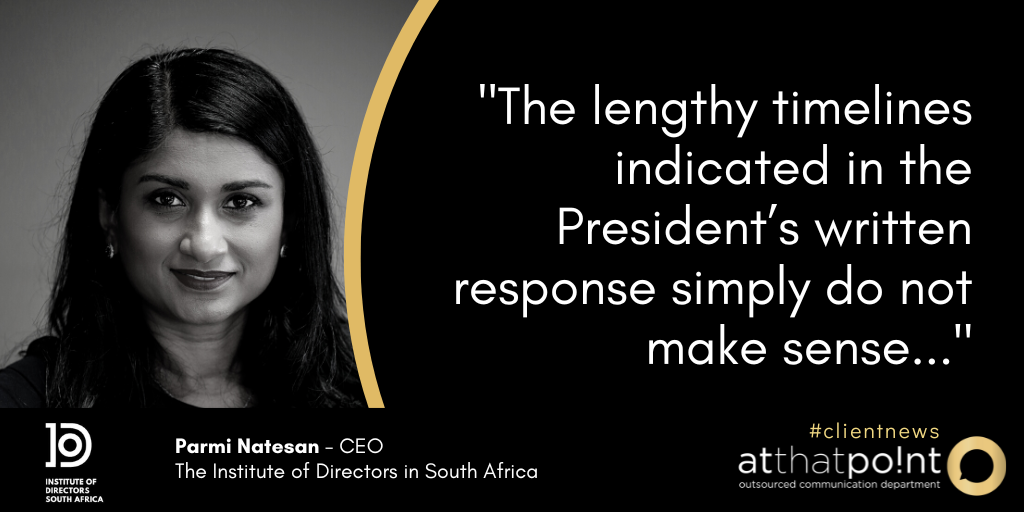 In his long-awaited plan to address the Zondo Commission’s recommendations, the President has set unwarrantedly long timelines in place for the establishment of better processes for selecting board members for state-owned enterprises (SOEs), says Parmi Natesan, CEO of the Institute of Directors in South Africa (IoDSA). “The Zondo Commission quite rightly found that the appointment and removal of board members and senior executives are being manipulated to facilitate state capture. This is an issue that the IoDSA has been highlighting for several years now and, more to the point, we have put in a lot of work with Government to provide solutions,” she says. “The lengthy timelines indicated in the President’s written response simply do not make sense, especially given the urgency of the matter.” In his response, the President indicates that Government accepted the need for “a process for the appointment of boards of state-owned enterprises that is not open to manipulation”. This process will involve independent panels with the appropriate technical expertise to recommend suitable candidates. Crucially, the “Guide for the Appointment of Persons to Boards and Chief Executive Officers of State-Owned and State-Controlled Institutions” that such panels would use will only be finalised in the 2023/24 financial year. “The President’s timeline is too long given the urgent need to begin repairing our SOEs; it’s also unwarranted because the Guide was apparently finalised in early 2019 after input from the IoDSA, among other organisations,” says Parmi Natesan, CEO of the IoDSA. “I can accept that there would be a need to revisit the document in the light of the Zondo Report, but this could be done rapidly. The IoDSA stands ready to work with the Department of Public Service and Administration to get this done, and certainly before the end of the current financial year. The work is largely done, assuming that the recommendations originally made by the IoDSA are in the existing version of the guide, why the delay?” She adds that she assumes that the independent panel would include representation from the IODSA which represents directors and is responsible for setting and maintaining the standards of professionalism amongst its members. The IoDSA is also the custodian of the King Code of Corporate Governance, which also continues to provide internationally respected guidance, including the governance of SOEs. The government also proposes the establishment of a central database of potential candidates, but this is again a duplication of work that has already been done, Ms Natesan continues. The IoDSA’s database of individuals who have obtained one of its two certifications—Certified Director and Chartered Director—already exists. These certifications offer a way to identify individuals who have been found to possess the professional skills and personal qualities necessary to act as directors based on the IoDSA’s Directorship Competency Framework. “I’m sure I don’t speak just for the IoDSA when I say that we are growing weary of responding to the Government’s requests for help in sorting out the governance mess at the SOEs and not seeing any action,” Ms Natesan concludes. “We implore the government not to reinvent the wheel here—much of the work needed to put a proper process for making credible board appointments is already done. The country cannot afford any further delay.” [1] The full text of the speech is available at https://www.gov.za/speeches/president-cyril-ramaphosa-response-president-cyril-ramaphosa-commission-inquiry-allegations. ENDS MEDIA CONTACT: Stephné du Toit, [email protected], 084 587 9933, www.atthatpoint.co.za For more information on the IoDSA please visit: Website: www.iodsa.co.za Twitter: @The_IoDSA LinkedIn: Institute of Directors in South Africa Company Page Facebook: Institute of Directors South Africa The full text of the speech is available at https://www.gov.za/speeches/president-cyril-ramaphosa-response-president-cyril-ramaphosa-commission-inquiry-allegations.
0 Comments
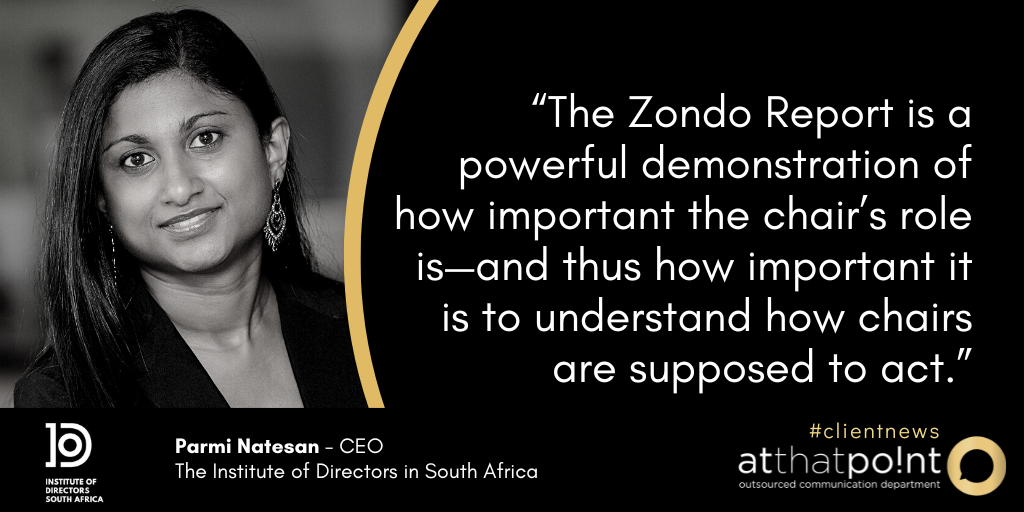 On one level, the Zondo Report reads like an over-the-top morality tale about the perils of poor governance. In this morality tale, the villain is frequently the chair of the captured state-owned enterprise (SOE). This is particularly ironic because it is the chair who is supposed to be the apex of the governance structure, the very person charged with ensuring the organisation is run on ethical and effective lines, says Parmi Natesan, CEO, Institute of Directors in South Africa (IoDSA). “When one reads what went wrong at South African Airways, South African Airways Technical, the Passenger Rail Agency of South Africa, Transnet and others, it seems that a chair played a crucial role in either facilitating corruption or actively participating in it,” she says. “The Zondo Report is at once an indictment of these leaders but also a powerful demonstration of how important the chair’s role is—and thus how important it is to understand how chairs are supposed to act.” The final Zondo Report contains two graphic illustrations of the ways in which chairs can cause damage. In relation to the former chair of South African Airways, the report says: “Ms Myeni knowingly misrepresented to the Minister of Public Enterprises that the Board of SAA had taken two decisions when it had not. Those misrepresentations caused financial losses to SAA. It is likely that her conduct constitutes the crime of fraud.”[1] In relation to another SOE chair, it states, “Ms Yakhe Kwinana, received payments from JM Aviation around the time that these decisions were taken. The payments were likely kick-back payments to these officials.” As a leader of the governing body, the chair plays a crucial role in the ability of the organisation to set and realise its strategic goals. The chair should be independent and non-executive. In line with its non-prescriptive approach, King IV does not provide detailed guidance on what the proper role of the chair should be; that has been fleshed out in Practice Notes created by the IoDSA.[2] The chair’s core role is to lead the governing body. The performance of the governing body is thus ultimately the responsibility of the chair; conversely, the chair needs to enjoy the confidence and support of his or her board colleagues. As such, he or she is accountable to the board. “Clearly, an incompetent or unethical chair can compromise the whole governance structure. In that case, though, it becomes incumbent on the board to raise the alarm even if, as in the case of our SOEs, best-practice governance is not followed because of the overwhelming power of the state as the sole shareholder,” she explains. Given the importance of the chair’s role, King IV took the innovative step of recommending that a lead independent director be appointed in every case, even if the chair is deemed independent. According to Ansie Ramalho, Chair of the King Committee, the thinking of the King Committee was that a lead independent was necessary to strengthen the effectiveness and independence of the board. Having a lead independent director offers support for the chair in that the incumbent in this position could serve as a sounding board if called upon by the chair. At the same time, having the position in place is a mitigation against the possibility of a rogue or domineering chair, says Ramalho. In particular, the lead independent oversees the regular evaluation of the chair’s performance, and acts as a conduit between the rest of the board and the chair in the event of there being an issue of some sort between the chair and board. “One might well imagine that if the SOE boards had a strong lead independent director, there might have been some change of reining in rogue chairs,” Ms Natesan ends. “In any event, a read through of the Zondo Report is convincing evidence that it’s vital to have a good governance structure in place, and that begins with the right chair.” ENDS MEDIA CONTACT: Stephné du Toit, [email protected], 084 587 9933, www.atthatpoint.co.za For more information on the IoDSA please visit: Website: www.iodsa.co.za Twitter: @The_IoDSA LinkedIn: Institute of Directors in South Africa Company Page Facebook: Institute of Directors South Africa [1] Judicial Commission of Inquiry into State Capture Report: Part VI. Vol 4: All the recommendations, p 4, available at Home - Commission of Inquiry into Allegations of State Capture [2] IoDSA, “Practice Notes. The role of the chair and lead independent” (22 September 2022), available at https://cdn.ymaws.com/www.iodsa.co.za/resource/collection/562ED5CF-02E8-4957-97C8-D3F0C66A7245/King_IV_Practice_Note_on_Role_of_Chair_and_LID.pdf. 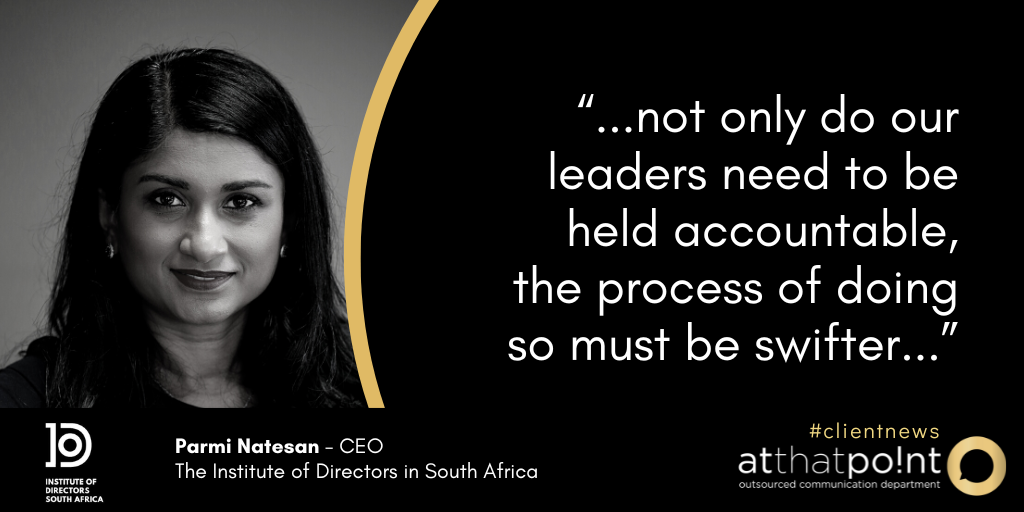 In its final report, the Zondo Commission repeatedly comments that directors of the various captured state entities have not been properly held accountable for the massive damage they have caused to the organisations they were supposed to serve, and thus indirectly to the country as a whole. The Institute of Directors in South Africa (IoDSA) strongly endorses these observations. “The issue of director accountability is one that the IoDSA has been raising in public forums for a number of years. In a letter to the Commission in September 2021, we specifically raised the point that not only do our leaders need to be held accountable, the process of doing so must be swifter,” says Parmi Natesan, CEO, IoDSA. “We recommended the establishment of a constitutional means of alternate dispute resolution to facilitate prompt and effective consequence management both for transgressing directors and those charged with exercising oversight over them.” In its final report, the Zondo Commission maintains that legal processes typically only manage to identify “egregious abuses of public power” when the perpetrators or those that protect them are out of power. The Report also makes the point that the delayed legal process is a “cumbersome, time consuming [sic] exercise”. It therefore recommends that the Companies Act’s 24-month time bar relating to delinquency directors should be extended. This would allow prosecution of, amongst others, the 2014 board of Eskom and two erring South African Airways directors.[1] One of those two directors, Dudu Myeni, the former chair of South African Airways, was declared a delinquent director in 2020 but, says Ms Natesan, only after an extremely time- and resource-intensive process. As a result, director accountability remains rare. The Report then makes a more sweeping recommendation that Government “give consideration to the creation of a statutory offence rendering it a criminal offence for any person vested with public power to abuse public power vested in that person by intentionally using that power otherwise than in good faith for a proper purpose” [emphasis in original].[2] “The IoDSA certainly supports the idea that the 24-month time bar should be extended to allow for holding the numerous defaulting directors identified in the Report to be investigated and prosecuted if necessary. Furthermore, we strongly believe that a more streamlined and rapid process needs to be found,” Ms Natesan says. “An excellent short cut would be to mandate that all directors have to belong to the professional body for directors, so that they could be disciplined under a Code of Conduct and barred from serving as directors if they are found to be in breach of their duties, without the long delays inherent in the legal process. “The benefit would be that the transgressing director would not remain in office while the legal process takes its course—something that would surely have contained the damage caused to SOEs like Eskom and SAA.” ENDS MEDIA CONTACT: Stephné du Toit, [email protected], 084 587 9933, www.atthatpoint.co.za For more information on the IoDSA please visit: Website: www.iodsa.co.za Twitter: @The_IoDSA LinkedIn: Institute of Directors in South Africa Company Page Facebook: Institute of Directors South Africa [1] Judicial Commission of Inquiry into Allegations of Capture, Corruption and Fraud in the Public Sector Including Organs of State, Report: Part VI, Volume 4: Summary of Recommendations 37 (p 95), 12 -3(p 3) and 119 (p 43), available at www.statecapture.org.za/site/files/announcements/672/OCR_version_-_State_Capture_Commission_Report_Part_VI_Vol_IV_-_Recommendations.pdf. [2] Ibid 119 (p 43), 122-6 (p44). 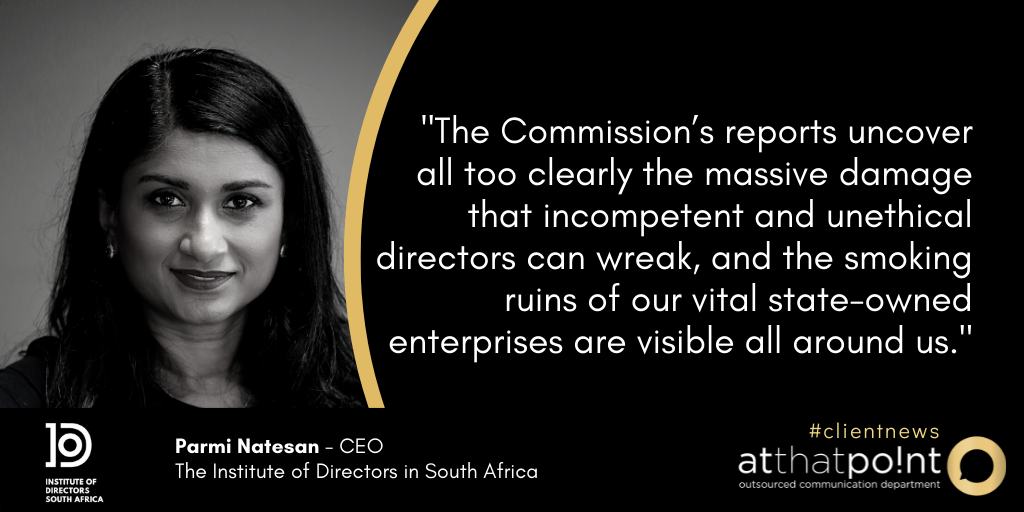 In its final report, the Judicial Commission of Inquiry into State Capture (Zondo Commission) recommends the enactment of legislation to establish a professional body for public procurement officials.[1] While there is no doubt this is a good move, the Institute of Directors in South Africa wishes to express its disappointment that its recommendation for a similar enforced body for directors was not acted on. “We wrote to the Commission in September 2021 setting out the compelling reasons to recommend the establishment of a statutory professional body for directors. By not doing so, we believe that the Commission missed a historic opportunity to alter fundamentally the governance landscape of the country for the better,” says Parmi Natesan, CEO: IoDSA. “The Commission’s reports uncover all too clearly the massive damage that incompetent and unethical directors can wreak, and the smoking ruins of our vital state-owned enterprises are visible all around us.” A mandatory professional body for directors would have the benefit of requiring that directors would have to keep their skills updated via a rigorous process of continuous professional development. The professional body would also be able to keep its members abreast of developments in governance best practice. Equally important, members of such a professional body would be bound by a code of conduct, in terms of which they could be rapidly disciplined and even have their membership terminated. Termination could in turn signal to the market to not appoint them as a director. “As we now contemplate the possibility of years of litigation to bring the main actors in state capture to book, establishing a mechanism through which unethical or incompetent directors could be swiftly and relatively inexpensively held to account looks very attractive,” she observes. The IoDSA further argues that alongside a statutory professional body for directors, there should be enforcement of formal director designations registered with the South African Qualifications Authority (SAQA). Such formal designations would provide a way to ensure that directors have the necessary competencies to serve as a director based on rigorous testing against a formal competency framework. Designation holders who fail to keep their skills updated in line with the CPD framework would have their designations removed, reducing their attractiveness to companies. The IoDSA already owns and awards two SAQA-recognised director designations—Certified Director (SA) and Chartered Director (SA). “Directorship is now a serious profession that requires individuals to possess a definite set of skills and competencies, and the ability to provide strong leadership based on sound ethical principles,” Ms Natesan concludes. “While this was not covered in the Commission’s final recommendations, the IoDSA will continue to lobby for directorship to become a regulated profession, providing both the public and private sectors with a growing pool of properly qualified individuals who have committed to ethical leadership and have signed on to a solid code of conduct.” ENDS MEDIA CONTACT: Stephné du Toit, [email protected], 084 587 9933, www.atthatpoint.co.za For more information on the IoDSA please visit: Website: www.iodsa.co.za Twitter: @The_IoDSA LinkedIn: Institute of Directors in South Africa Company Page Facebook: Institute of Directors South Africa [1] Judicial Commission of Inquiry into Allegations of Capture, Corruption and Fraud in the Public Sector Including Organs of State, Report: Part VI, Volume 4: Summary of Recommendations, 62, p24, available at www.statecapture.org.za/site/files/announcements/672/OCR_version_-_State_Capture_Commission_Report_Part_VI_Vol_IV_-_Recommendations.pdf. 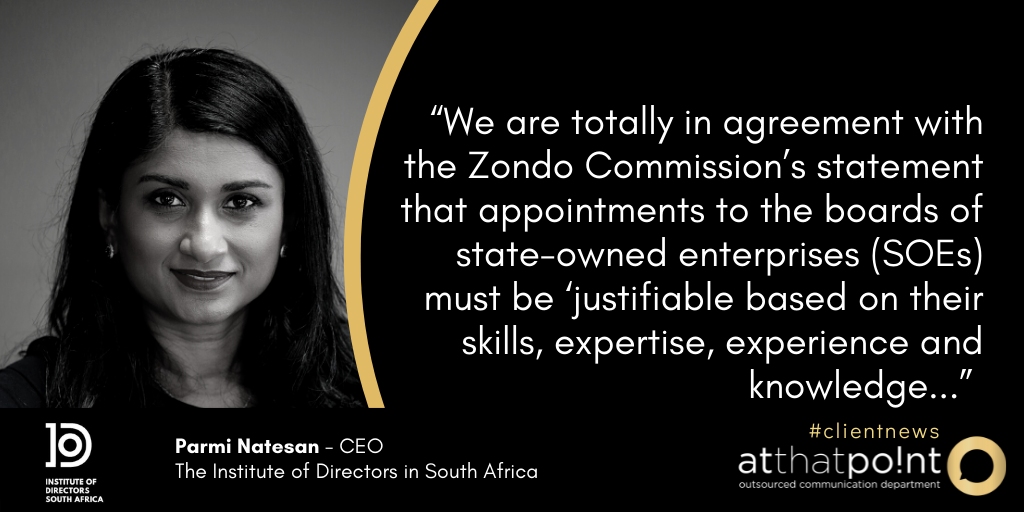 The Institute of Directors in South Africa (IoDSA) broadly welcomes the recommendation to establish a Standing Appointment and Oversight Committee to strengthen the process of nominating and appointing directors of state-owned enterprises. The recommendation was made in the final volume of the report of the Judicial Commission of Inquiry into State Capture (Zondo Commission).[1] “We are totally in agreement with the Zondo Commission’s statement that appointments to the boards of state-owned enterprises (SOEs) must be ‘justifiable based on their skills, expertise, experience and knowledge’[2], and that the state, through the responsible ministers, has signally failed to appoint the ‘right kind of people’[3] to the boards of SOEs,” says Parmi Natesan, CEO, IoDSA. “This is an issue that the IoDSA has repeatedly raised, and which is covered in King IV. The notion that board members should be appointed based on the needs of the organisation is revolutionary in the South African context, where political appointments have effectively collapsed the public sector.” Principle 7 of King IV states that: The governing body should comprise the appropriate balance of knowledge, skills, experience, diversity and independence for it to discharge its governance role and responsibilities objectively and effectively. This goal is particularly hard to attain for SOEs because the state, as the sole shareholder, has the power to make appointments unilaterally. In the sector supplement for SOEs, King IV advises SOEs and executive authority to collaborate in the nomination process and to make it transparent. King IV requires the nomination of any board candidate to take into account the needs of the governing body in terms of skills, knowledge and experience, the governing body’s diversity, and whether the candidate meets the “appropriate fit and proper criteria”.[4] Ms Natesan argues that these criteria should include the IoDSA’s Director Competency Framework.[5] Given the reality that the state has power that shareholders in the private sector do not, the Zondo Commission’s recommendation that a committee be set up to govern the process of nominating and electing SOE board members is a good one. In fact, in a letter to the Commission in September 2021, the IoDSA recommended the establishment of a consistent and transparent nominations process that included a nominating panel comprising representatives of appropriate stakeholder interests. “The Commission’s recommendation is actually much stronger because it seemingly envisages that the proposed committee would have the power to control the nomination process even against the wishes of the executive in order to secure the future of the SOE,” Ms Natesan says. “Our only disappointment is that the list of persons to serve on the oversight committee does not include a representative of the IoDSA, preferably somebody who holds one of our SAQA-registered directorship designations and who would be in a position to provide expert input on the directorship role and the competencies required.” ENDS [1] Judicial Commission of Inquiry into Allegations of Capture, Corruption and Fraud in the Public Sector Including Organs of State, Report: Part VI, Volume 4: Summary of Recommendations 247, p 181, available at www.statecapture.org.za/site/files/announcements/672/OCR_version_-_State_Capture_Commission_Report_Part_VI_Vol_IV_-_Recommendations.pdf. [2] Ibid 6, p 2. [3] Ibid 112, p 41. [4] IoDSA, Report on Corporate Governance for South Africa 2016, p 15, available at https://www.iodsa.co.za/page/king-iv. [5] Available at www.iodsa.co.za/resource/collection/56E77A6D-56E7-46EF-86EF-B425DD00EA9B/Director_Competency_Framework.pdf. MEDIA CONTACT: Stephné du Toit, [email protected], 084 587 9933, www.atthatpoint.co.za For more information on the IoDSA please visit: Website: www.iodsa.co.za Twitter: @The_IoDSA LinkedIn: Institute of Directors in South Africa Company Page Facebook: Institute of Directors South Africa 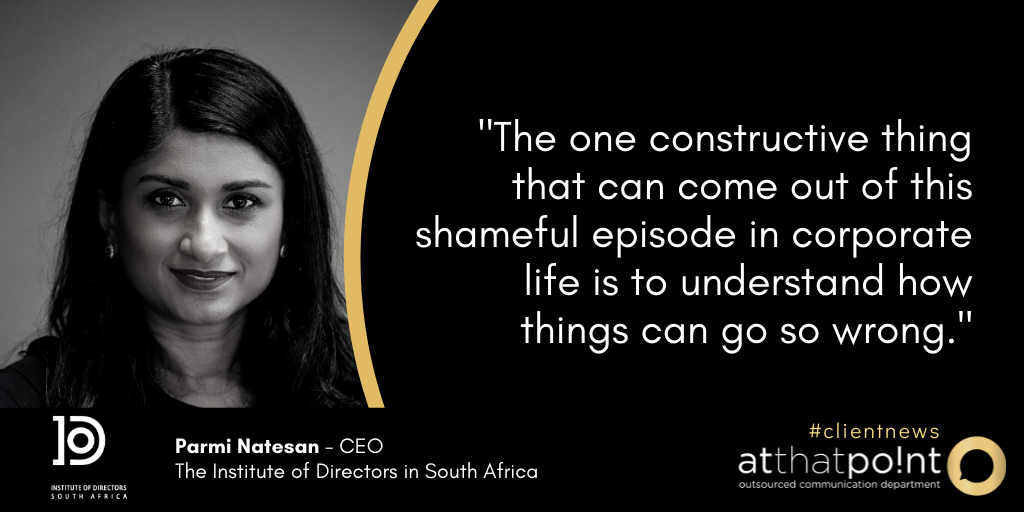 In detailing some of the crimes and misdemeanours that enabled state capture, the Zondo Commission’s report is in fact offering office-bearers across business and society a morality tale. In this spirit, the assessment of the performance of the erstwhile Chair of South African Airways, Dudu Myeni, acts as a case study of how important the role of the Board Chair is, and how not to do the job, argues Parmi Natesan, CEO of the Institute of Directors in South Africa (IoDSA). “Myeni’s tenure as Chair of SAA should be seen as an object lesson that all current and future Board Chairs should take to heart,” she says. “The one constructive thing that can come out of this shameful episode in corporate life is to understand how things can go so wrong.” Natesan says that key lessons can be drawn from the Zondo Commission’s report on Myeni’s tenure as Chair: Criteria and process are critical for the appointment of leadership positions on boards. The Report states that Myeni was appointed as Chair despite being an underperforming director. All board members, and particularly the Chair, need to be appointed in terms of rigorous criteria. “The IoDSA maintains that the primary role of the Chair is to lead the Board and set its tone, which in turn sets the tone for the whole organisation,” she notes. “Political connections are wholly irrelevant when it comes to ascertaining an individual’s fitness to serve in this critical leadership position. “It’s clear that SAA suffered from the same problem as other state-owned enterprises—undue political interference not only in the appointment of senior leaders but also in bypassing basic governance such as, in this case, holding the Chair to account.” As the Report makes clear, there were several attempts by the Board to seek redress on Myeni’s performance, but they came to nothing because she was protected by the political establishment. The Chair must have the respect of the rest of the Board. Without a proper voting process, it is unlikely that the Chair would have the Board’s respect and support, and he or she would thus be ineffective as a leader. As the Report makes clear, Myeni ruled by creating a climate of fear and suspicion that discouraged other Board members and executives from raising the alarm. In such a case, clearly, the Board was effectively dysfunctional and thus wrong decisions were repeatedly taken. Chairs must understand and fulfil their role. The Report makes the point that Myeni overstepped her mandate as Chair. In particular, she made a “series of operational choices at SAA that saw it decline into a shambolic state”. The first point to make is that Boards, and their Chairs particularly, are not supposed to involve themselves in operational matters, which are the preserve of management. The Chair’s role is strategic, and primarily involves ensuring that the Board functions optimally in fulfilling its oversight role. “This section of the Zondo Commission Report graphically illustrates how important the Chair is as the apex of governance within any organisation, and thus how destructive an ineffective or downright malign Chair can be,” Natesan concludes. ENDS MEDIA CONTACT: Idéle Prinsloo, [email protected], 084 587 9933, www.atthatpoint.co.za For more information on the IoDSA please visit: Website: www.iodsa.co.za Twitter: @The_IoDSA LinkedIn: Institute of Directors South Africa Company Page Facebook: Institute of Directors South Africa 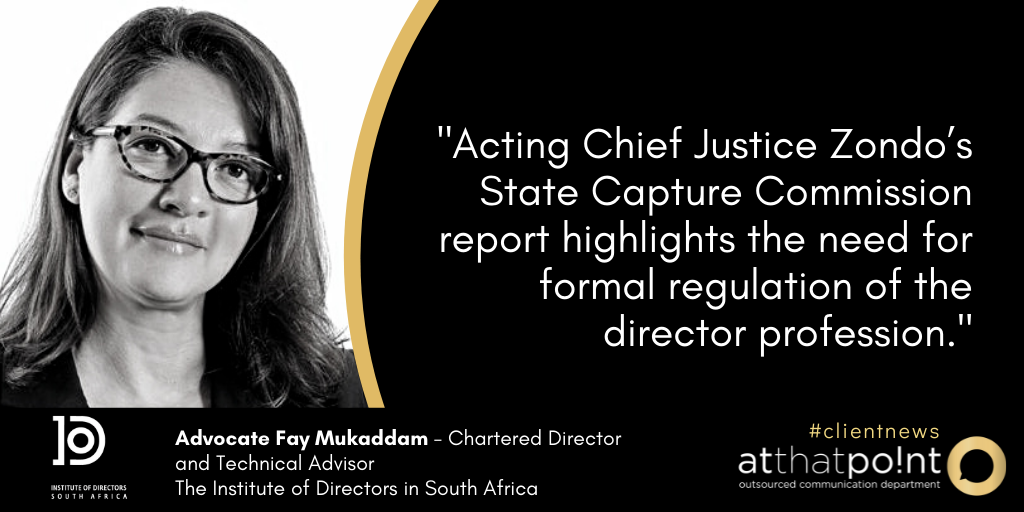 “Acting Chief Justice Zondo’s State Capture Commission report highlights the need for formal regulation of the director profession,” says Advocate Fay Mukaddam, Chartered Director (SA) and Governance Specialist at the Institute of Directors South Africa (IoDSA). As examples, Mukaddam points to the first volume’s allegations of gross mismanagement at SAA and its chairperson at the time eventually being declared a delinquent director by the courts. “While legal action can be taken to prohibit an incompetent or criminal director from serving on any boards in the future, this is effectively closing the stable door after the horse has bolted,” she says, insisting that early prevention is better than eventual punishment. A flawed system What stands out in the report is cadre deployment that saw people appointed to boards in SOEs and public sector entities because of their political connections rather than their fitness as directors. It is evident that they often did not understand or respect their mandate and either neglected or ignored their obligation to the organisation and the law. As a result, they allowed poor performance to infect the corporate culture they were meant to heal and led their organisation to ruin. This signals a flawed recruitment, screening, selection and appointment process and a lack of appreciation for what the roles and responsibilities of a director and board are. "If one doesn't understand what they are elected to do, how can they acquit themselves of their fiduciary duties?" asks Mukaddam. It also appears that, due to their questionable appointment, they were not subjected to the same performance interventions or rehabilitation processes as everyone else. The impact of poor directors SAA is a prime example of what happens when even a few poor directors are appointed to boards. Unfortunately, director acumen and commitment to their duties vary widely across organisations in both the public and private sectors, and low performance can go unnoticed until it is too late. “Professional directors as a collective have a significant impact on the economy, yet almost anyone can become a director without possessing the level of competency essential to their office,” says Mukaddam. The vetting process is largely left to the incumbent board or the vote of the organisation’s shareholders. Mukaddam suggests that this process is unsustainable, especially in developing countries like South Africa where robust policy is critical to economic recovery. A better approach “It is long past due that an independent regulator is empowered to accredit incoming directors against global professional standards, hold them accountable for misconduct, and formalise their continuous professional development on pain of being disqualified,” states Mukaddam. Other significant professionals, like doctors, auditors or attorneys, are required to pass a bar exam or professional evaluation before being allowed to practice. They are also subject to the disciplinary oversight of their professional body and must commit themselves to monitored lifelong learning. Yet none hold more sway over their nation’s prosperity than public and private professional directors. “A regulator, supported by government and the private sector, is far more effective than a long and difficult legal battle for a delinquency judgement after an organisation is already crippled,” says Mukaddam. ENDS MEDIA CONTACT: Idéle Prinsloo, 082 573 9219, [email protected], www.atthatpoint.co.za For more information on the IoDSA please visit: Website: www.iodsa.co.za Twitter: @The_IoDSA LinkedIn: Institute of Directors South Africa Company Page Facebook: Institute of Directors South Africa 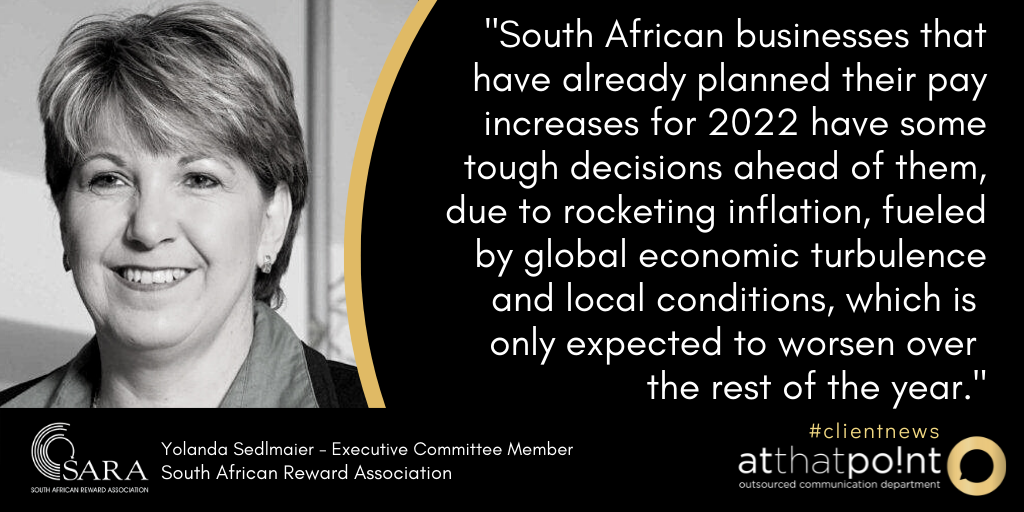 Conclusions and recommendations made in part one of the state capture inquiry report align closely to a letter sent by the Institute of Directors South Africa (IoDSA) to the Zondo Commission in September 2021. The letter included recommendations on director competencies as well as the nomination and selection of directors. Section 580 of the state capture inquiry report mentions that the appointment of board members to SOEs “has proven to be problematic and does not represent the “robust and transparent” process recommended by King IV”. It also highlights the common “disjuncture between the fiduciary duties of SOE board members and the profile, skills and expertise of incumbents”. Section 582 and 583 further explain why “the national interest demands that state owned enterprises operate under efficient and professional leadership which requires that the appointment procedure is transparent, not driven by party political interests but made in accordance with objective criteria”. King IV makes a few important recommendations relating to the governance of the nomination process. The first of these is Recommended Practice 15: “the processes for nomination, election and ultimately, the appointment of members to the governing body should be formal and transparent”. Recommended Practice 16 states that “before nominating a candidate for election, the governing body should consider the collective knowledge, skills and experience required by the governing body, the diversity of the governing body, and whether the candidate meets the appropriate fit and proper criteria”. “While we welcome the alignment between the conclusions of the report and what the IoDSA has been saying for years, we are anxious to see the implementation of the recommendation on the professionalisation of directors,” says Parmi Natesan, CEO of the IoDSA. Professionalising directorship will not automatically eliminate incompetent or corrupt directors any more than professionalising medicine or engineering achieved that goal. It will, however, provide an objective framework for ensuring that directors have the required skills in terms of an objective competency framework, and that they can be disciplined in terms of a professional Code of Conduct. Alongside the professional skills a modern director needs, it is vital that individuals who serve as directors possess the necessary personal qualities. Directors should above all be ethical, independent and courageous. Courage and independence are particularly necessary because directors must put the interests of the organisation first, and this may mean going against the interests of the parties which appointed them or, indeed, their own interests. “Our highly respected director development programmes, Certified Director (SA) and Chartered Director (SA) designations, and governance advisory services are available immediately to support the implementation of the recommendations made by the Commission,” says Natesan. ENDS MEDIA CONTACT: Idéle Prinsloo, 082 573 9219, [email protected], www.atthatpoint.co.za For more information on the IoDSA please visit: Website: https://www.iodsa.co.za/ Twitter: https://twitter.com/the_iodsa LinkedIn: https://www.linkedin.com/company/institute-of-directors-in-southern-africa Facebook: https://www.facebook.com/TheIoDSA |
Archives
July 2024
Categories
All
|

 RSS Feed
RSS Feed